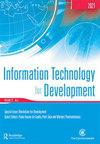The Latin American and Caribbean digital divide: a geospatial and multivariate analysis
IF 5.1
3区 管理学
Q1 DEVELOPMENT STUDIES
引用次数: 18
Abstract
ABSTRACT This paper examines spatial patterns of information and communication technology (ICT) adoption and utilization and seeks to understand underlying reasons for the digital divide in Latin America and the Caribbean (LAC). Five distinctive clusters of technology adoption and use factors are identified, characterized, and geographically mapped. Disparities in adoption and utilization in ICTs in 36 LAC countries are examined Using a Spatially Aware Technology Utilization Model, fifteen socioeconomic, innovation, business efficiency, infrastructural, affordability, and societal openness indicators are posited to be associated with six ICT indicators. Human development, civil liberties, political rights, urban population, and electricity access are found to influence ICT adoption and use in LAC indicating socio-economic, urban, societal openness, and infrastructural dimensions of the digital divide in this world region. For a sub-sample of Latin American nations, regression findings point to human development and infrastructural factors. Spatial bias in confirmatory analysis is diagnosed, and policies are recommended.拉丁美洲和加勒比数字鸿沟:地理空间和多变量分析
本文考察了信息和通信技术(ICT)采用和利用的空间格局,并试图了解拉丁美洲和加勒比地区(LAC)数字鸿沟的根本原因。确定了五个不同的技术采用和使用因素集群,并对其进行了描述和地理映射。利用空间感知技术利用模型考察了36个拉丁美洲和加勒比国家采用和利用信息通信技术的差异,假设15个社会经济、创新、商业效率、基础设施、可负担性和社会开放性指标与6个信息通信技术指标相关。研究发现,人类发展、公民自由、政治权利、城市人口和电力供应影响拉丁美洲和加勒比地区ICT的采用和使用,这表明该世界区域的社会经济、城市、社会开放程度和基础设施方面存在数字鸿沟。对于拉丁美洲国家的子样本,回归结果指向人类发展和基础设施因素。确认性分析的空间偏差被诊断出来,并建议政策。
本文章由计算机程序翻译,如有差异,请以英文原文为准。
求助全文
约1分钟内获得全文
求助全文
来源期刊

Information Technology for Development
Multiple-
CiteScore
11.30
自引率
16.70%
发文量
34
期刊介绍:
Information Technology for Development , with an established record for publishing quality research and influencing practice, is the first journal to have explicitly addressed global information technology issues and opportunities. It publishes social and technical research on the effects of Information Technology (IT) on economic, social and human development. The objective of the Journal is to provide a forum for policy-makers, practitioners, and academics to discuss strategies and best practices, tools and techniques for ascertaining the effects of IT infrastructures in government, civil societies and the private sector, and theories and frameworks that explain the effects of IT on development. The concept of development relates to social, economic and human outcomes from the implementation of Information and Communication Technology (ICT) tools, technologies, and infrastructures. In addition to being a valuable publication in the field of information systems, Information Technology for Development is also cited in fields such as public administration, economics, and international development and business, and has a particularly large readership in international agencies connected to the Commonwealth Secretariat, United Nations, and World Bank.
 求助内容:
求助内容: 应助结果提醒方式:
应助结果提醒方式:


